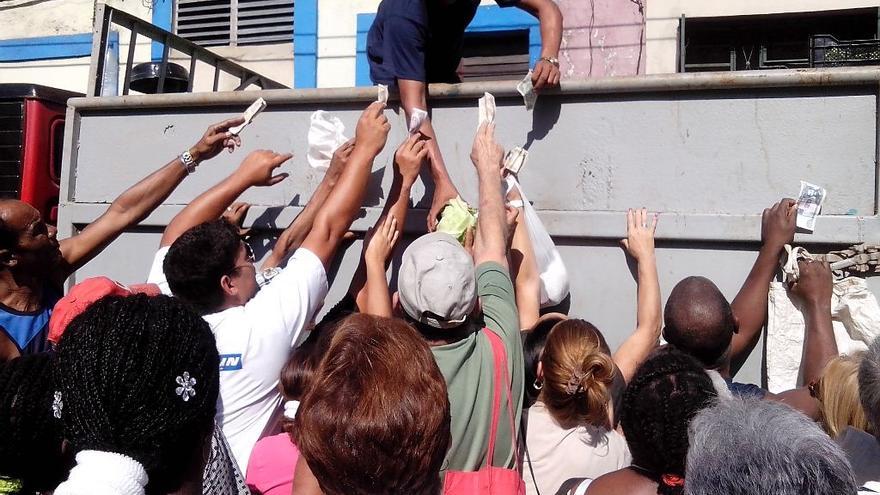
![]() 14ymedio, Havana 29 July 2021 — Tons of aid that partner nations are sending to the island will be distributed to Cuban families starting Friday. The process will begin in Havana, epicenter of the July 11 protests. It will continue in other provinces with large populations and where demonstrations were significant — Matanzas, Ciego de Avila, Santiago de Cuba, Holguin, Guantanamo and Isla de La Juventud — before extending throughout the country.
14ymedio, Havana 29 July 2021 — Tons of aid that partner nations are sending to the island will be distributed to Cuban families starting Friday. The process will begin in Havana, epicenter of the July 11 protests. It will continue in other provinces with large populations and where demonstrations were significant — Matanzas, Ciego de Avila, Santiago de Cuba, Holguin, Guantanamo and Isla de La Juventud — before extending throughout the country.
The minister of Domestic Commerce, Betsy Diaz Velazquez, said the aid will be distributed “for free,” Normally a shipment of humanitarian aid would not require such an unnecessary clarification but there is widespread fear in Cuba that aid from Russia, Mexico and Nicaragua will end up for sale on the rationed market or, even worse, in hard currency stores.
The minister stressed that the costs associated with distributing the aid — which will consist largely of rice, grains, cooking oil, tuna, canned meat, past and sugar — will be covered by the state.
Diaz explained that each province will also receive extra shipments of certain products. For example, the city of Pinar del Rio will receive canned meat as well as flour to be used in the production of bread and cookies.
Each household in Cienfuegos will receive a liter of cooking oil, Sancti Spiritus residents will get flour for cookies, families in the eastern provinces will get tuna while Villa Clara, Camaguey, Mayabeque y Las Tunas will get dried beans. Havana will get flour for bread and cookies as well as milk, with priority for the latter be given to seniors over the age of sixty. This generated critical comments on government media outlets from people who considered this unfair and demanded that the milk go to entire households instead.
The minister thanked “friendly nations” for their contribution of aid to the Cuban people during the pandemic and once again laid all blame for the current economic crisis on the US embargo despite the fact that the country is the island’s main food supplier.
In recent days Cuba has received tons of humanitarian aid from its main partners. On Sunday two Russian planes carrying ninety tons of humanitarian aid touched down in Havana. The cargo consisted mainly of wheat flour, canned meats and sunflower oil as well as a million surgical masks. (Domestically produced masks, which were expected to available for sale by the end of June, have yet to appear in stores.)
Two ships have arrived from Mexico with deliveries of fuel, food and medicine. Among the main foodstuffs are powdered milk, dried beans, flour, canned tuna and cooking oil.
On Wednesday Nicaraguan First Lady and Vice-President Rosario Murillo announced the pending arrival of a shipment from Nicaragua, though she did not provide details. Murillo stated, “Very soon our people, our government, will be sending… a boat with Nicaraguan food supplies to Cuba to contribute [to relief efforts] in these pandemic times, which include a pandemic, the Yankee plague, which we are battling.”
In the words of Madrid-based Cuban economist Elias Amor, the aid is “a treatment for pain more intense than the nation is experiencing.” In a post about the planned aid distribution, which also discussed the 60-year-old basket of rationed foodstuffs that that has long curtailed people’s freedom of choice, Amor warns that this new humanitarian aid is “bread for today but hunger for tomorrow.”
Although the aid’s arrival could mollify those who took part in the July 11 protests out of desperation and weariness, Amor believes further outbreaks could occur once supplies run out.
“If the regime wanted to use this aid to buy time in order to implement structural reforms, that would make sense. But many of us fear the necessary 180-degree turn towards the economic freedom that Cuba needs is not part of their plans.”
____________
COLLABORATE WITH OUR WORK: The 14ymedio team is committed to practicing serious journalism that reflects Cuba’s reality in all its depth. Thank you for joining us on this long journey. We invite you to continue supporting us by becoming a member of 14ymedio now. Together we can continue transforming journalism in Cuba.
